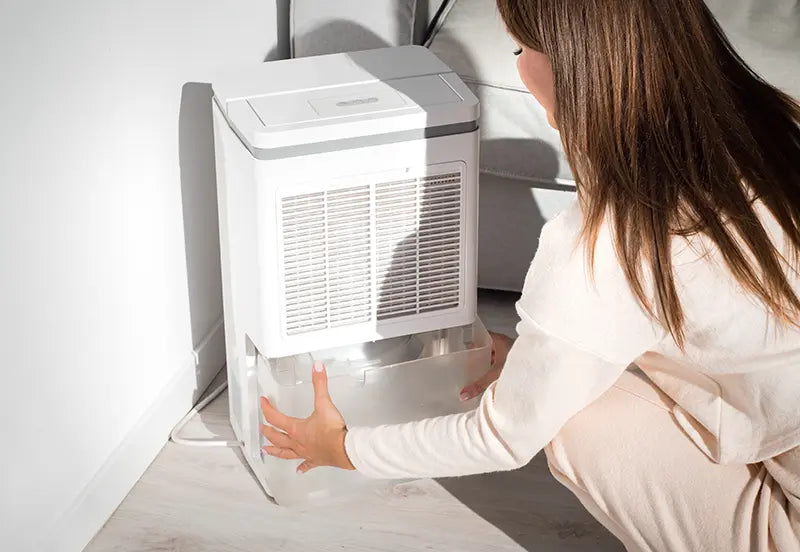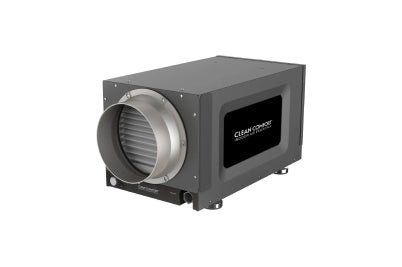Humidity can be problematic in your home during the warmer months, especially if you have a basement. A basement dehumidifier may be necessary when there are high levels of humidity in the house to prevent excessive moisture buildup and the damage it can cause. A basement dehumidifier will make your home drier by removing moisture from the air, creating a drier environment.
While moisture is most likely to occur in the lower levels of your home, such as the basement, it can affect the rest of your home, leading to discomfort and respiratory issues. If you find that your whole home is humid during the warm months, then a whole house dehumidifier may be the better option.
Comfort in your home is vital. Superior Home Supplies has the products you need to help maintain this comfort all year round, including the best basement dehumidifier and home dehumidifiers. Contact Superior Home Supplies today to find out which HVAC appliances and accessories you need to maximize the comfort in your home.
Why do people need a home dehumidifier?
A home dehumidifier is needed for any area that sees high humidity levels. High moisture levels can lead to the growth of mold, mildew, and other allergens. Depending on the humidity levels in the area, a basement dehumidifier, or a whole-house dehumidifier may be needed.
Ideally, you will want the humidity levels in your home to be between 30% to 60%. At this level, moisture buildup will be prevented, and the air quality will be improved. Your air conditioning system is designed to assist with some of the moisture levels in your home. While you can purchase a hygrometer to monitor the humidity levels, there are some signs you can watch out for that may indicate that your humidity levels are higher than they should be. Some symptoms of high humidity in your home include:
- A feeling that the air is thick or heavy.
- Visible mold on floors, ceilings, or walls.
- Condensation or wet surfaces in your home.
- A mildew smell, which will typically be stronger in the basement.
- A moldy smell on items stored in the basement or lower level closets.
Dehumidifier use during different seasons
The best dehumidifiers are designed to be used during any season when there are high levels of humidity or moisture in the air. For most climates, you will need to use a basement dehumidifier or whole house dehumidifier from spring through early fall. As a general rule of thumb, when it comes time to turn on your heater, you will no longer need the dehumidifier.
Dehumidifier use in different climates
The climate of the area you live in will also play a role as to when and for how long you will need to use a basement dehumidifier or whole house dehumidifier. The best dehumidifiers are designed to work in temperatures exceeding 60 degrees. So for areas with colder climates throughout the year, such as in the North, you may only need to use your dehumidifier for the basement, crawlspace dehumidifier, or whole house dehumidifier in the summer months.
Some of the best dehumidifiers are designed to work in temperatures down to 41 degrees but would only need to be used when the temperature drops that low if you have areas in the home with high moisture levels. In areas with low humidity, such as the arid areas of the southwest, dehumidifiers are often not needed.
Dehumidifier for the basement FAQs
Are you looking for the best dehumidifier for the basement? Understanding a few facts about them can help you pick out the best model and ensure proper operation.
Basement dehumidifiers come in various capacities
When choosing the best size for your humidifier, you will need to choose the correct capacity for the moisture level in the house. The best dehumidifiers will be the appropriate size, allowing them to remove moisture efficiently. The capacity is listed in pints and indicates how much moisture the unit can remove in a 24-hour period. So if your system is rated a 50-pint dehumidifier, it will remove 50 pints of moisture per day, but it may only have a 25-pint storage tank, meaning it will need to be emptied twice per day.
Specific models have lower operating costs
When looking for the best dehumidifier for the basement, you may want to consider models with an Energy Star rating, which lets you know that the appliance is energy efficient. This means they will remove moisture from your home more efficiently.
Cost and specs for a basement-only dehumidifier
When looking for the best basement dehumidifier, you will need to choose the right size and specs for your basement and moisture removal needs. For a mid-sized room in a basement that gets damp, a 30-pint dehumidifier for the basement would be sufficient. But, if you have a larger room or a room in the basement that gets significant moisture, you may need a 40-pin to 50-pint model.
If you are looking for a basement dehumidifier that will cover the whole space, you will need to invest in a 75-pint to a 100-pint model depending on the size of the area and humidity level. A 75-pint dehumidifier for the basement will run an average of $800 to $1,200, whereas a 100-pint basement dehumidifier can run anywhere from $1,000 to $1,400.
What is the best dehumidifier for a basement?
Choosing the best dehumidifier for the basement will depend on many factors, such as the size of the area, the level of moisture in your home, and how quietly you would like your system to operate. While many great basement dehumidifiers are on the market, below are some of the top options.
Black+Decker 4,500 Square Foot Dehumidifier
The Black+Decker Dehumidifier is the best dehumidifier for the basement that is 50-pint and designed to cover up to 4,500 square feet. The model is reasonably priced and works for most basements with moderate humidity levels. It features a 24-hour timer to prevent the system from overworking and expending more energy than necessary.
It is Energy-Star certified to reduce your overall energy use and cost. This Energy Star dehumidifier also has a washable mesh filter, a 16.4-foot drain hose, and a built-in pump. Additionally, the system has a control panel with an easy-to-read LED display and features a quiet operation.
Honeywell 70-Pint Dehumidifier
One of the best dehumidifiers for larger basements is the Honeywell 70-pint dehumidifier. Though it comes with a higher price tag, this basement dehumidifier is a high-capacity dehumidifier that covers 4,000 sq. ft. and is designed for large spaces with high moisture levels. It can effectively remove 70 pints of water and bring your basement to the desired humidity level.
This dehumidifier for the basement is available from Amazon, and you can choose a model with or without a pump. The pump will kick in when the 14-pint capacity water tank is full. It also has a digital humidistat designed to measure the humidity levels in large rooms. The system will trigger on or off depending on the moisture level in the room.
The Honeywell model also features an auto shut-off and auto restart in the event of a power failure and is backed by one of the best five-year warranties in the industry.

Dehumidifier whole home FAQs
If you decide that the best option for your home is a whole house dehumidifier, then it is essential to know a few facts about these humidifiers to find the best dehumidifiers to meet your needs.
Sizing is important
One of the most important considerations to make when choosing a whole house dehumidifier is the size. You will need to take into account the moisture levels in your home, what type of HVAC system you have, and the size of the space the whole house dehumidifier will cover.
Filter changes will be needed
During the dehumidification process, your whole house dehumidifier will remove unwanted debris from the air in your home. This means that changing the air filter in your whole house dehumidifier will be required and should be done according to the manufacturer’s guidelines.
Cost and specs for a whole home dehumidifier
Installing a central dehumidifier or whole house dehumidifier can be more expensive than just opting for a basement dehumidifier. Yet, they are the ideal option when you are experiencing excess humidity throughout your entire home. The size, specifications, and cost of a whole house dehumidifier will depend on the configuration of your home, the size of the space, and humidity levels
Whole house dehumidifiers will run anywhere from $1,300 to $1,700 for standard models and $1,600 to $2,800 for high-efficiency models.
Maximizing dehumidifier efficiency
Part of having the best basement dehumidifier for your home involves ensuring that your basement dehumidifier works as efficiently as possible. By following the few tips below with your basement dehumidifier, you can maximize its ability to remove moisture from the air and its overall energy efficiency.
- Set your humidity levels: The best dehumidifier for the basement will feature digital controls that allow you to set the relative humidity. 30 to 50% is ideal for reducing mildew, mold growth, and dust mites.
- Place your basement dehumidifier in the right spot: The best dehumidifiers will be located in an area where air can move freely around it, ensuring plenty of space for venting.
- Close up the area where your basement dehumidifier is located: To get the best performance out of your basement dehumidifier, you will want to prevent additional humidity from coming into the space. Close all windows and doors to the area you are using the basement dehumidifier for.
- Empty the tank on your basement dehumidifier regularly: Your basement dehumidifier will shut off when the tank is full unless it has a built-in pump to push the water out. Emptying the dehumidifier regularly will ensure it continues to run as needed.
- Keep your dehumidifier clean: If the air filter on your basement dehumidifier is clogged, it will prevent air flow and lessen the efficiency of the system. Make sure to monitor your filter and change it when required.
What size dehumidifier for basement
The best dehumidifier for the basement will be the appropriate size for the space. To choose the right size, you will need to consider the size of the space and the moisture level.
- Large wet areas: The best basement dehumidifier for a large area that sees heavy moisture is a 50-pint to 70-pint dehumidifier for the basement. This size can usually handle around 3,000 sq. ft. of space that has high humidity.
- Medium areas with moderate moisture: for a space between 1,000 to 1,200 square feet and moderate moisture, the best dehumidifier for the basement would be a 30 to 40-pint basement dehumidifier.
- Small areas with minimal moisture: If you have an area less than 600 sq. ft., the best dehumidifier for the basement would be a 30-pint basement dehumidifier or a portable dehumidifier.

Takeaways
- Choosing the best basement dehumidifier for your home will depend on the size of the space and the level of moisture in the air.
- Energy-rated can be the best basement dehumidifier if you want to maximize energy efficiency and lower your utility bills.
- The best dehumidifiers can run even more efficiently by keeping them clean, changing the filter, and putting them in the proper location.
- If you have moisture problems throughout your entire house, a whole house humidifier may be the best option.
Superior Home Supplies has the best dehumidifiers for your home
If you are looking for the best basement dehumidifier or a whole house dehumidifier, Superior Home Supplies can help. We know how vital dehumidifiers are to the function of your HVAC system and the comfort of your home, and we strive to provide our customers with the right appliances and components to fit their needs. Contact us today at 855-578-7374 to find out more.
